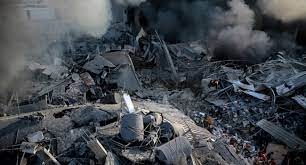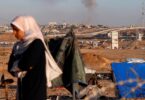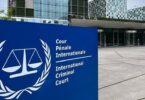GAZA (AFP): Israeli infantry backed by warplanes mounted an incursion deeper into Gaza, the army said Friday, as it readies for a ground offensive against Hamas for the deadliest attack in the country’s history.
As the conflict raged into its 21st day, there was no letup in Israel’s relentless strikes on the Gaza Strip, with European leaders calling for “humanitarian pauses” to allow in critically needed aid.
Israel has been bombarding the Palestinian territory since Hamas gunmen stormed across the border on October 7, killing 1,400 people, mostly civilians, and kidnapping more than 220 others, according to Israeli officials.
So far, Gaza’s Hamas-run health ministry says the strikes have killed more than 7,000 people, mostly civilians and many of them children, raising growing calls for protection of innocent people caught in the conflict.
With tens of thousands of Israeli troops massed alongside the Gaza border ahead of a widely expected ground offensive, the army said its forces had staged a brief ground incursion into central Gaza.
“During the last day, IDF ground forces, accompanied by IDF fighter jets and UAVs, conducted an additional targeted raid in the central Gaza Strip,” it said in the second such operation in as many days.
Black-and-white footage released by the military showed a column of armoured vehicles as a thick cloud of dust billowed into the sky after the strikes.
Tanks and infantry had staged a similar raid targeting the Islamist Hamas in northern Gaza the previous night, the army said.
As concern spiralled over the fate of the 2.4 million Palestinians trapped under the relentless bombardment, European Union leaders called late Thursday for “continued, rapid, safe and unhindered humanitarian access and aid to reach those in need through all necessary measures including humanitarian corridors and pauses for humanitarian needs”.
– ‘Our lives stopped’ –
Only 74 trucks of food, water and medicine have been permitted to enter Gaza since the war began in a figure described by aid groups as vastly insufficient.
Before the fighting began, around 500 trucks entered daily, according to the United Nations.
Israel has cut supplies of food, water and power to Gaza, and has insisted no fuel can be imported as it could be used by Hamas, which it has vowed to destroy in response to the October 7 attacks.
That has forced 12 of the territory’s 35 hospitals to close, forcing the UN agency for Palestinian refugees UNRWA to “significantly reduce its operations”.
“Without fuel, there will be no humanitarian response, no aid reaching people in need, no electricity for hospitals, no access to clean water, and no availability of bread,” UNRWA Commissioner-General Philippe Lazzarini said.
Israel has won staunch backing from allies including the United States for its military action in Gaza, demanding Hamas release the 224 hostages it snatched on October 7 that include a mix of Israelis and foreign nationals.
The fate of the hostages remains a complicating factor for Israel’s planned ground operation.
Hamas’ armed wing said Thursday that “almost 50” hostages had been killed in the bombardments, in a claim that could not be independently verified.
Four female hostages have been released, but for relatives of those left behind, the anguish continues.
“Our lives stopped,” said Moran Betzer Tayar of the day her nephew and his wife were abducted, telling reporters in Paris she was “worried sick” and desperate to keep the fate of the hostages in the public eye.
– ‘Wherever we go, we will die’ –
Inside Gaza, the punishing strikes have left people “with nothing but impossible choices” the UN’s humanitarian coordinator for the occupied Palestinian territory said Thursday.
“Nowhere is safe in Gaza,” said Lynne Hastings as UN figures showed that 1.4 million people — more than half of Gaza’s population — have been displaced by the war.
Israel has repeatedly urged civilians in northern Gaza to move south for their safety, but strikes have also hit southern areas and evacuation routes, Hastings said.
Rahma Saqallah fled south with her family, heeding Israeli warnings. But after strikes killed her husband and three of her children, she was heading back home.
“Wherever we go, we will die,” she told AFP, as she prepared to leave the southern city of Khan Yunis to return to Gaza City with her surviving child.
“They told us to leave for the south and then they killed us (here).”
The situation has been exacerbated by dire medical shortages, with operations now carried out without anaesthetic and ice-cream trucks turned into makeshift morgues.
There are fears the death toll will grow exponentially if Israel launches a ground operation that Prime Minister Benjamin Netanyahu says is being prepared.
Israel faces growing calls to ensure its response does not cause increasing civilian casualties.
“Israel has to do everything in its power, as difficult as it is, to protect innocent civilians,” US President Joe Biden said this week.
Four Palestinians killed in Israeli raid in West Bank
Israeli forces killed at least four Palestinians during a dawn raid in the north of the occupied West Bank, health officials said Friday, with Hamas members among the dead.
“Four killed by occupation (Israeli) bullets in Jenin and Qalqilya at dawn today,” the Ramallah-based Palestinian health ministry said in a statement.
The Palestinian news agency Wafa said at least three Palestinians were killed in “violent clashes” in the city of Jenin during an incursion by “a large contingent” of Israeli forces.
A dozen others were also injured during the skirmishes, the agency reported.
The Palestinian Islamist movement Hamas announced in a separate statement that one of its fighters was killed during the raid in Jenin.
The group also said another member was also killed during an Israeli incursion into the town of Qalqilya, south of Jenin.
The Israeli military did not immediately comment on the incidents.
Violence has risen sharply in the West Bank in the wake of the October 7 attacks by Hamas on Israel.
Since then, more than 100 people have been killed and more than 1,900 injured in the West Bank, according to health officials there, mostly in raids by Israeli troops or in clashes with Israeli settlers.
On October 7, throngs of Hamas gunmen poured from Gaza into Israel, killing 1,400 people, mostly civilians, and kidnapping 224 more, according to Israeli officials.
In retaliatory Israeli air and artillery strikes, at least 7,028 people have been killed in the Gaza Strip, including 2,913 children, according to figures released by the health ministry in the Hamas-controlled territory.
The fatalities in Gaza are the highest there since Israel withdrew from the Palestinian territory in 2005.
EU urges corridors and pauses
EU leaders have demanded “humanitarian corridors and pauses” in Israel’s war against Hamas, urging aid access for civilians trapped in besieged Gaza, where the United Nations says “nowhere is safe.”
Concern is growing about the regional fallout from the conflict, with Washington warning Iran against escalation while striking facilities in Syria it says were used by the Iranian Revolutionary Guard Corps and others.
Israel has carried out relentless strikes on Gaza since Hamas gunmen stormed across the border on October 7, killing 1,400 people, mostly civilians, in the deadliest attack since Israel’s creation.
The Israeli strikes have killed more than 7,000 people, mostly civilians, according to the Hamas-run health ministry, with growing calls for protection of innocents caught in the conflict.
Late Thursday, EU leaders called for “continued, rapid, safe and unhindered humanitarian access and aid to reach those in need through all necessary measures including humanitarian corridors and pauses for humanitarian needs”.
Just 74 trucks of food, water and medicine have been permitted to enter Gaza, home to 2.4 million people, since the conflict began — a figure described by aid groups as vastly insufficient.
Before the conflict, around 500 trucks entered daily, according to the United Nations.
Israel has cut supplies of food, water and power to Gaza and insisted no fuel can be imported as it could be used by Hamas.
That has forced 12 of the territory’s 35 hospitals to close, and the UN agency for Palestinian refugees UNRWA has started to “significantly reduce its operations.”
“Without fuel, there will be no humanitarian response, no aid reaching people in need, no electricity for hospitals, no access to clean water, and no availability of bread,” UNRWA Commissioner-General Philippe Lazzarini said.
– ‘Impossible choices’ –
Israel defends its operations, with staunch backing from allies including Washington, and has demanded Hamas release 224 foreign and Israeli hostages it seized on October 7.
The fate of the hostages remains a complicating factor for Israel’s planned ground operation.
Hamas’s armed wing said Thursday that “almost 50” Israeli hostages had been killed in Israeli bombing raids, a claim that AFP could not verify.
Four hostages have been released, but for relatives of those left behind, the anguish continues.
“Our lives stopped,” said Moran Betzer Tayar, of the day her nephew and his wife were abducted.
She told a press conference in France she was “worried sick” and desperate to keep the fate of the hostages in the public eye.
Rights groups and international organisations have demanded the immediate release of hostages, who include women and children.
Inside Gaza, the punishing strikes have left people “with nothing but impossible choices” the UN’s humanitarian coordinator for the occupied Palestinian territory said Thursday.
“Nowhere is safe in Gaza,” Lynne Hastings said in a statement.
– ‘Wherever we go, we will die’ –
Israel has repeatedly urged civilians in northern Gaza to move south for their safety, but strikes have also hit southern areas and evacuation routes, Hastings said.
Around 45 percent of all housing in Gaza has been damaged or destroyed, according to the UN, citing local authorities, and satellite images show vast swathes of destruction.
Rahma Saqallah fled south with her family, heeding Israeli warnings. But after strikes killed her husband and three of her children, she was heading back home.
“Wherever we go, we will die,” she told AFP, as she prepared to leave the southern city of Khan Yunis to return to Gaza City with her surviving child.
“They told us to leave for the south and then they killed us (here).”
Hamas on Thursday released a list of almost 7,000 names of people it said had been killed in Israeli strikes, after US President Joe Biden cast doubt on the toll from the territory.
The list of 6,747 names gave the age, sex and identity card number of each victim, adding that 281 bodies had not yet been identified. Another 1,600 people, including 900 children, are missing and may be under rubble, according to the UN, citing local authorities.
The war’s surging death toll is by far the highest since Israel unilaterally withdrew from the coastal territory in 2005 — a period that has seen four previous Gaza wars.
The situation has been exacerbated by dire medical shortages, with operations now carried out without anesthetic and ice-cream trucks turned into makeshift morgues.
There are fears that the toll will grow exponentially if Israel launches a ground operation that Prime Minister Benjamin Netanyahu says is being prepared.
Israeli troops entered northern Gaza on Wednesday for a “targeted raid” that came in “preparation for the next stages of combat”, the military said.
– US warns Iran against escalation –
Israel faces growing calls to ensure its response does not cause increasing civilian casualties.
“Israel has to do everything in its power, as difficult as it is, to protect innocent civilians,” Biden said this week.
An expansion of fighting on the ground also risks a wider regional conflagration, with Iran’s foreign minister warning US officials and military.
“We do not welcome the expansion and scope of the war in the region,” Hossein Amir-Abdollah said at the UN.
“But I warn if the genocide in Gaza continues, they will not be spared from this fire.”
American and allied forces in Iraq and Syria have been attacked at least 16 times this month, according to the Pentagon, which blamed Iranian-backed groups.
And the US military struck two facilities in eastern Syria used by Iranian forces and affiliated groups, Defence Secretary Lloyd Austin said Thursday, stressing they were “separate and distinct” from the Israel-Hamas conflict.
Biden also sent a rare “direct message” to Iran’s supreme leader warning against further escalations, the White House said.
“My warning to the Ayatollah was that if they continue to move against those troops, we will respond, and he should be prepared. It has nothing to do with Israel,” Biden said.
Exchanges of fire across the Israel-Lebanon border have prompted the evacuation of tens of thousands of people on either side.
And six people were wounded after a rocket fired in the conflict hit the Egyptian border town of Taba on Thursday, Egyptian media reported.







